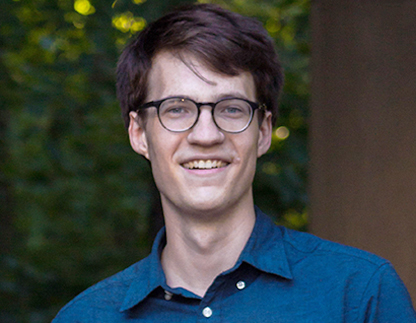It is always exciting to make a discovery or unexpected connection within an archival document. These are the 'lightbulb' moments that motivate me to keep exploring.”
Andrew Barrett (he/him)
PhD Student in the Department of Musicology

Andrew Barrett is a PhD student in the Department of Musicology at the Bienen School of Music. He previously earned a Bachelor of Music in guitar from the University of Nebraska-Lincoln and a master’s degree in guitar and musicology from Indiana University, where he worked as an associate instructor in the Department of Music Theory and an editorial assistant at the Center for the History of Music Theory and Literature.
Andrew’s dissertation explores the intermingling of friendship and politics in the United States-Spanish musical networks during the Cold War. His involvement in the Graduate School’s Dissertation Proposal Development Program has allowed him to travel to archives in California and participate in workshops on grant writing.
How would you describe your research and/or work to a non-academic audience?
I am interested in understanding how major geopolitical events relate to the everyday work of musicians. We often think about this issue from the top down—as in how governments and political currents influence music. However, I am interested in a bottom-up approach that highlights how everyday musical activity can shape politics. In my research, I am asking these questions about Spanish musicians working in the United States during the early years of the Cold War, which was a time when the diplomatic relationship between Spain and the United States changed dramatically.
What have been some of the most memorable twists and turns of your career?
When I entered university, I planned to pursue a career in music performance, and I earned an undergraduate in jazz guitar before switching to classical guitar for my master’s. I initially did not expect that I would pursue a graduate degree in academic research, but it has emerged as my passion over the course of my studies. Still, I am grateful for my time as a performer, and these experiences have shaped my research and my perspective on musicology.
What do you find both rewarding and challenging about your research and/or work?
It is always exciting to make a discovery or unexpected connection within an archival document. These are the “lightbulb” moments that motivate me to keep exploring. On the other hand, searching for relevant sources is a time-intensive process and something that can often lead to dead ends. I have certainly experienced many moments of uncertainty about whether I am looking for the right things or consulting the right documents.
Why Northwestern?
I love that Northwestern offers the experience of studying musicology with world-class faculty at a research university while still being situated within a school of music. This opportunity to interact with fellow students who are performers is something I value. Simultaneously, Northwestern provides excellent opportunities for coursework outside of my discipline, and I have benefited enormously from classes in the Performance Studies and the Media, Technology, and Society departments.
How do you unwind after a long day?
I still enjoy playing guitar when time allows, and it has been wonderful to get to know both Evanston and Chicago. There are excellent concerts in the area, and I have made it to a few Cubs games over the past few years, which have been a lot of fun.
Tell us about a current achievement or something you're working on that excites you.
I will be visiting Spain later this year to participate in a conference and do archival work for my dissertation. I am excited about the opportunity to be in dialogue with Spanish musicologists and to build upon my previous archival work in the United States. My dissertation is a transatlantic project, and this trip will help me understand Spanish perspectives on events that I have previously tracked through archives in the United States.
Published: September 20, 2022
If you know a graduate student, postdoctoral trainee, graduate faculty member, staff member, or a member of our TGS alumni population who would make a great candidate for our TGS Spotlight Series, please complete this brief TGS Spotlight Series Nomination Form.